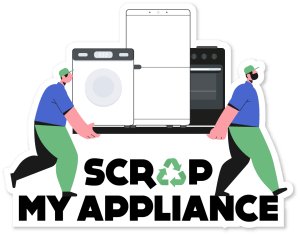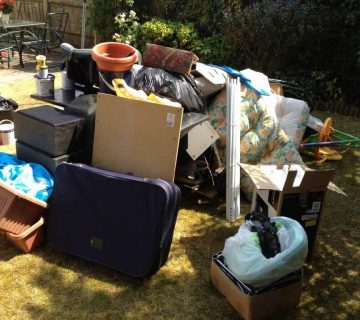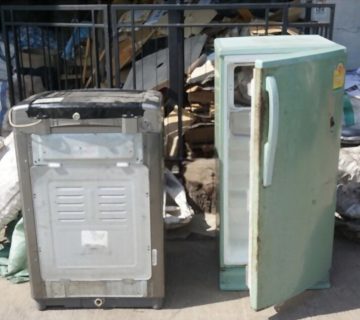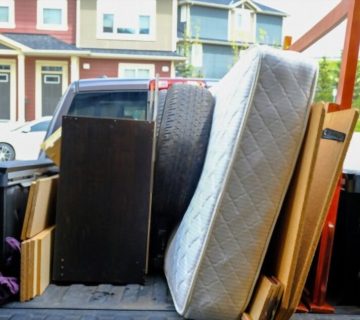There are various options for rubbish removal and waste clearance in the UK, but it is uncommon to find completely free services. However, there are a few avenues you can explore to minimise costs or potentially access cost-effective waste disposal options:
- Local council services
- Recycling centres
- Community recycling initiatives
- DIY waste disposal
Remember that waste management practices and regulations vary between regions and local UK authorities. It’s essential to check with your local council, recycling centres, or waste management providers to understand the options, associated costs, and any restrictions or guidelines for safe waste disposal in your area.
Local Council Services for Free Rubbish Removal
Local council services in the UK provide waste management and rubbish removal services, but they are typically funded through local taxes and fees rather than completely free. The cost of these services is usually included in the council tax paid by residents. However, the specific services offered and associated charges can vary between local authorities.
Here are some common waste management services provided by local councils:
- Regular Rubbish Collection: Local councils usually arrange for the regular collection of household waste from residential properties. The collection frequency may vary, but it is typically weekly or fortnightly. This service is included as part of the council tax and does not generally require additional payment.
- Recycling Services: Many local councils have implemented recycling programs encouraging residents to separate recyclable materials from general waste. Recycling bins or bags are provided, and collections are often carried out on the same schedule as regular rubbish collection. Recycling services are typically included in the council tax and do not usually incur extra charges.
- Bulky Waste Collection: Some local councils offer a bulky waste collection service for larger items that cannot be disposed of through regular rubbish collection. This can include items like furniture, appliances, and mattresses. However, there may be a fee associated with this service, and booking or specific collection arrangements may be required.
- Household Waste Recycling Centres (HWRCs): Local councils operate recycling centres where residents can bring various types of waste for recycling or disposal. These centres typically accept garden waste, electrical appliances, furniture, and household items. Using HWRCs is generally free of charge for residents within the council area.
It’s essential to check with your local council to understand their waste management services, associated costs, and specific guidelines for waste disposal in your area. Council websites or helplines can provide detailed information about the waste management services available to residents.

Household Waste Recycling Centres for Free Rubbish Removal
Household Waste Recycling Centres (HWRCs) in the UK provide a convenient and responsible way to dispose of various types of waste. While the services offered at HWRCs are typically available free of charge, it’s important to note that there may be specific restrictions and guidelines to follow. Here’s what you need to know about HWRCs for free rubbish removal:
- Accepted waste: HWRCs generally accept a wide range of household waste items, including garden waste, small electrical appliances, furniture, mattresses, wood, metal, cardboard, paper, glass, plastic bottles, and various other recyclable and non-recyclable materials.
- Local council access: HWRCs are operated by local councils, and access is usually limited to residents of the specific council area or nearby areas covered by an agreement between councils. Proof of residency, such as a council tax bill or driver’s license, may be required to use the facility for free.
- Usage restrictions: Each HWRC may have specific guidelines and restrictions regarding the type and quantity of waste that can be brought in. There may be limits on the number of visits per day or year and restrictions on commercial waste or certain hazardous materials.
- Sorting and separation: At HWRCs, waste is typically sorted into different containers or bins for recycling or proper disposal. Visitors are often required to separate their waste into the appropriate containers, following the guidance provided by on-site staff or signage.
- Site Facilities and assistance: HWRCs generally provide facilities such as recycling bins, waste containers, and assistance from staff to guide visitors in depositing their waste correctly. Some sites may have specific areas for certain types of waste, such as dedicated sections for garden waste or hazardous materials.
- Additional Charges: While using HWRCs is usually free for residents, there may be charges for specific services or waste types. For example, there may be fees for disposing of specific construction or demolition waste, vehicle tires, or asbestos. You should check with your local council or the HWRC website for potential charges.
Remember to adhere to any safety guidelines or instructions provided at the HWRC, including wearing appropriate protective gear when handling potentially hazardous materials. By utilising HWRCs effectively, you can contribute to recycling efforts and responsible waste disposal within your local community.
Community Recycling Initiatives for Free Rubbish Removal
Community recycling initiatives can be a great way to promote recycling and responsible waste management locally. While these initiatives may not always provide free rubbish removal services, they often offer alternative options for recycling or disposing of certain items. Here are some examples of community recycling initiatives:
- Community Recycling Events: Local communities or organisations may organise periodic or one-off recycling events where residents can bring specific types of waste for recycling or proper disposal. These events may focus on electronic waste, hazardous materials, or bulky items. While there may not be a charge for dropping off certain items, fees may apply for others.
- Freecycle or Freegle: Online platforms like Freecycle (www.freecycle.org) or Freegle (www.ilovefreegle.org) enable individuals within a community to give away unwanted items for free. These platforms promote the reuse and redistribution of items, reducing waste and supporting a circular economy.
- Local Recycling Schemes: Some communities establish their recycling schemes in partnership with local businesses or organisations. These schemes may focus on plastic bags, batteries, or textiles. Drop-off points or collection services may be available, often free of charge or with minimal fees.
- Repair and Reuse Initiatives: Community-led initiatives may encourage residents to repair or refurbish items instead of discarding them. Repair cafes, where volunteers help fix broken items, or upcycling workshops are examples of initiatives that promote reuse and waste reduction.
- Community Composting: Some communities establish communal composting schemes where residents can drop off organic waste like food scraps and garden trimmings. This waste is then composted and used for community gardens or distributed back to residents.
To find out about community recycling initiatives in your area, consider the following:
- Check with your local council or environmental department for any information on community recycling programs or events.
- Follow local community groups, environmental organisations, or social media groups focused on sustainability or waste reduction. They may announce or organise recycling initiatives.
- Stay informed about local events and community newsletters, as these channels often promote recycling initiatives.
Participating in community recycling initiatives helps with rubbish removal and contributes to a more sustainable and environmentally friendly community.

Diy Waste Disposal
DIY waste disposal refers to managing and disposing of waste on your own without relying on external services or professionals. It can be a cost-effective method for handling certain types of waste. Here are some considerations and tips for DIY waste disposal:
- Sorting and Categorising Waste: Start by separating your waste into different categories, such as recyclables, general waste, organic waste, hazardous waste, and bulky items. This allows you to handle each type of waste appropriately and dispose of it properly.
- Recycling: Many communities have recycling programs for materials such as paper, cardboard, plastic, glass, and metal. Find out about your area’s recycling facilities and guidelines and use them to divert recyclable items from the general waste stream.
- Composting: If you have a garden or outdoor space, consider composting organic waste such as fruit and vegetable scraps, coffee grounds, and yard trimmings. Composting can reduce the amount of waste going to landfills and provide nutrient-rich compost for your plants.
- Local Waste Disposal Facilities: Check with your local council or waste management authority to find out about waste disposal facilities available in your area. These facilities may include waste transfer stations, landfill sites, or recycling centres where you can drop off specific types of waste. Some facilities may charge a fee for specific items or quantities, so inquire about any applicable charges.
- Bulky Waste: If you have large or bulky items such as furniture, appliances, or mattresses to dispose of, consider options like donating them to charities, selling them online, or arranging for a bulk waste collection service. Many local councils offer bulky waste collection services for a fee, and private waste removal companies may also provide similar services.
- Hazardous Waste: Hazardous waste, including paints, chemicals, batteries, and electronic waste, requires special handling and should not be disposed of with regular household waste. Check with your local council or environmental agencies for guidance on proper disposal methods and designated drop-off locations for hazardous waste.
- Responsible Disposal: When disposing of waste, follow local regulations and guidelines to ensure it is done safely and responsibly. Avoid illegal dumping, which can harm the environment and result in fines or penalties.
Remember to prioritise safety when handling waste. Use protective gear when necessary, and be cautious with sharp objects, chemicals, or potentially hazardous materials.
While DIY waste disposal can be a practical solution for many everyday waste items, you must be aware of any limitations, restrictions, or regulations in your local area. Always check with your local council or waste management authority for specific guidance on waste disposal practices in your region.




